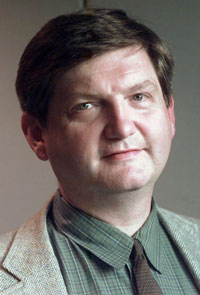A reporter’s right to protect confidential sources, a topic of debate both in the U.S. and internationally, will undergo another round of legal scrutiny after federal prosecutors formally appealed a decision shielding journalist James Risen’s sources in a CIA leak case.

Press freedom advocates hailed the U.S. District Court judge’s ruling in July that Risen did not have to identify his sources during the trial of former CIA officer Jeffrey Sterling for disclosing classified information, calling it a landmark First Amendment decision. On Wednesday, federal prosecutors appealed the ruling, according to news reports.
In his 2006 book State of War, Risen, who is also a national security reporter for The New York Times, described a botched, top-secret CIA operation to sabotage Iran’s alleged nuclear program. The federal government has sought to compel Risen to reveal his source for his information multiple times in conjunction with its criminal case against Sterling. Risen, invoking his First Amendment rights, has fought three subpoenas of his testimony since 2008, all of which have failed, according to the Reporters Committee for Freedom of the Press (RCFP).
U.S. District Judge Leonie Brinkema ruled in July that while Risen must testify as to the accuracy of his reporting and verify some information and quotes in his book, he would not be compelled to reveal his source. The Justice Department has argued that a qualified reporter’s privilege hasn’t been established, and that even if it were recognized, it wouldn’t apply in this case because the government didn’t have an alternative source for the information it is seeking. However, Brinkema’s opinion stated that the courts have recognized a qualified reporter’s privilege to protect confidential sources under the First Amendment and that Risen’s right to protect his source in this instance outweighed the prosecutor’s need to establish his case.
Judge Brinkema also noted in the decision that the government had ample other evidence to prove that Sterling was Risen’s source, thus failing one of the criteria imposed by a Fourth Circuit court decision that would overcome the reporter’s privilege. “A criminal trial subpoena is not a free pass for the government to rifle through a reporter’s notebook,” Brinkema’s ruling states. “The government must establish that there is a compelling interest for the journalist’s testimony, and that there are no other means for obtaining the equivalent of that testimony.” The government failed in both respects, she wrote.
The case marked the first time a journalist was successful in invoking the privilege to refuse to testify at both the grand jury and trial stages of a federal prosecution, RCFP said, making it a First Amendment milestone in the eyes of some legal scholars. Nonetheless, The New York Times reported, other scholars were troubled by the judge’s argument that Risen’s testimony could be “adverse to his penal interest because receiving classified information without proper authorization is a federal felony.” This reasoning could be interpreted as validating the use of the Espionage Act against journalists, the Times said, although no such prosecution has been successful.
The Risen case is the latest in a series of high-profile U.S. prosecutions involving confidential sources over the past decade. In 2005, Judith Miller was jailed for 85 days for refusing to divulge her source in another CIA leak case. In the same proceeding, Time magazine White House correspondent Matthew Cooper, who was also facing contempt charges, agreed to testify after a prolonged fight to avoid jail time. Rhode Island television reporter Jim Taricani was ordered to spend six months under house arrest in 2004 for refusing to reveal who leaked an FBI surveillance tape. Risen himself, who has frequently been a thorn in the sides of government officials, was held in contempt by a federal judge in 2004 for refusing to identify sources for stories about Wen Ho Lee, the nuclear scientist once suspected of spying.
The right to protect journalistic sources has been a topic of debate internationally as well. Mexican journalists have been guaranteed the right to protect the identity of their sources since 2006. In January 2010, the French Parliament passed the “Law 2010-1 of January 4, 2010, on the Protection of Journalistic Sources,” which enshrines the reporter’s privilege except in cases of “overwhelming public interest.” Despite this legislation, French President Nicolas Sarkozy has been embroiled for a year in a scandal in which he is accused of illegally intercepting journalists’ phone calls in order to determine the identity of government sources.
In the midst of the News Corp. International phone hacking scandal in the U.K. this year, the London Metropolitan Police tried to use the Official Secrets Act in September to force The Guardian to reveal Scotland Yard sources for stories about the now-defunct News of the World. Officials later dropped the issue.
International courts and treaties have also weighed in. Principle eight of the OAS’s Declaration of Principles on Freedom of Expression states that “Every social communicator has the right to keep his/her source of information, notes, personal and professional archives confidential.” In September 2010, the Grand Chamber of the European Court of Human Rights built on earlier rulings that established the right of journalists to protect sources, and unanimously held that police cannot search media premises or seize journalistic materials unless they can show it is absolutely necessary in the investigation of a serious crime and have obtained a judicial warrant.
In the U.S., 40 states have “shield laws” in place to protect journalists from being forced to reveal confidential sources, according to RCFP, but a federal version has been stalled in Congress for years.
An attorney for Risen, Joel Kurtzberg, told Politico he would fight the appeal.
